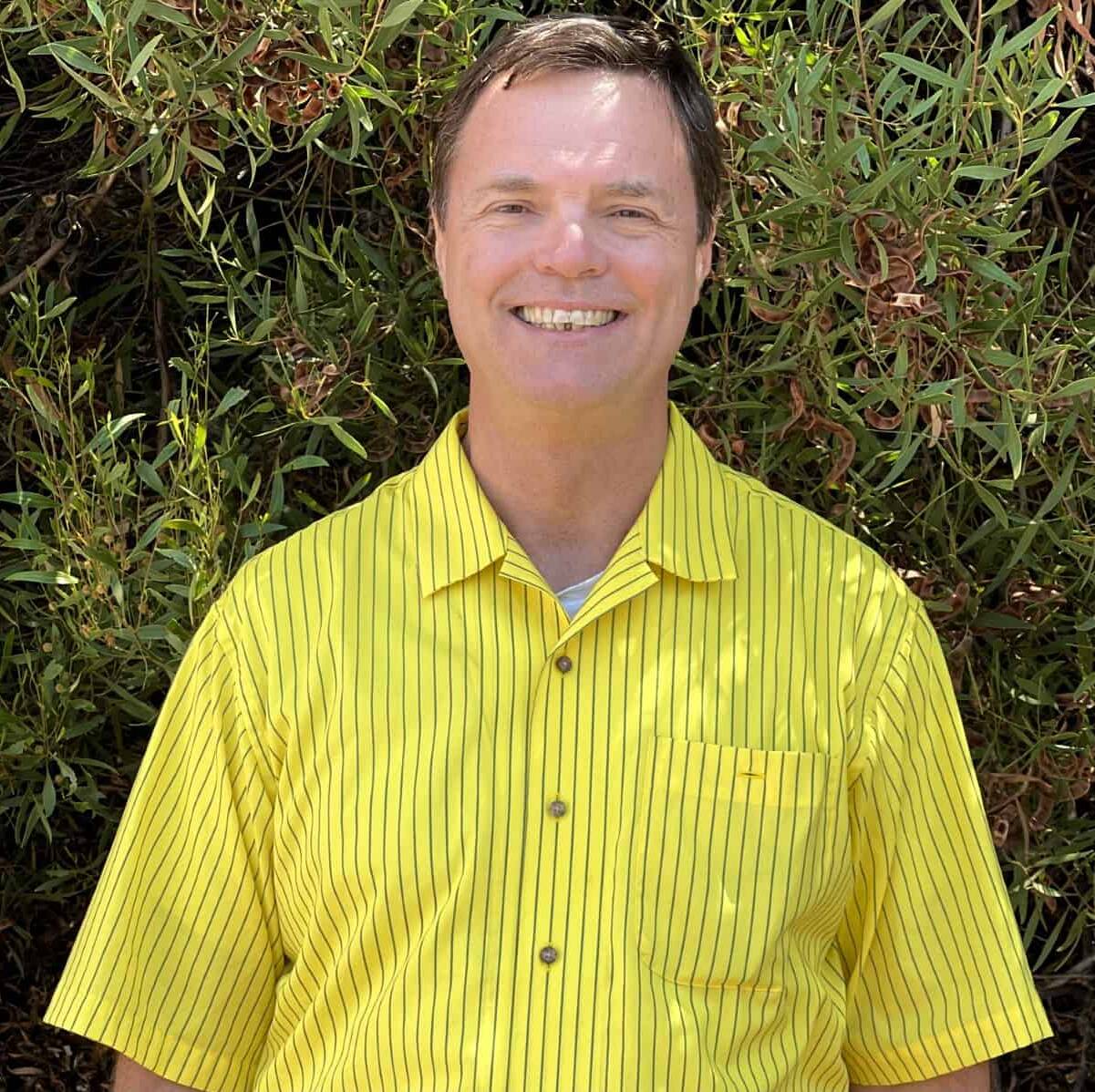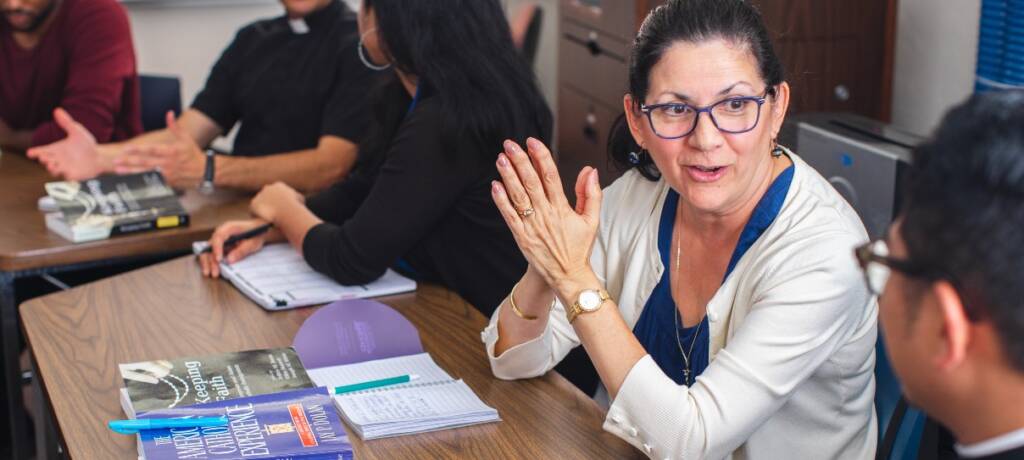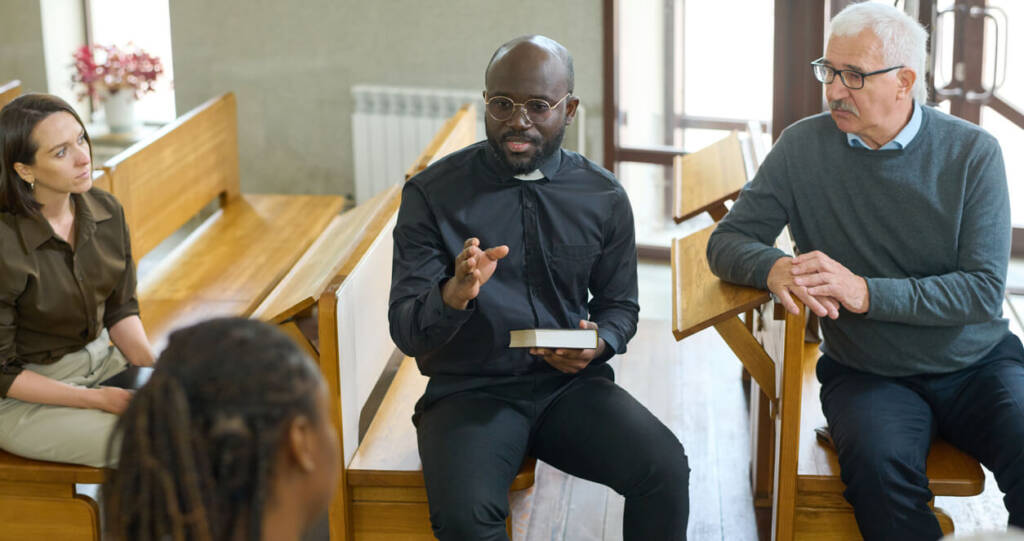As Catholics, we are on a dynamic and lifelong journey of deepening our relationship with God — a process formally referred to as faith formation. As we explore our faith, we answer the call to continually grow in spirituality, integrating our practice into daily life through reflection, prayer, and service. This process shapes not only individual beliefs but also how we engage with the world around us.
In this blog post, we share practical tips for growing in your faith and maintaining an active and meaningful relationship with God.
What Is Faith Formation?
Faith formation encompasses the process by which we grow in our faith. It describes an ongoing spiritual journey, our answer to an invitation to develop our relationship with God through learning, reflection, and action. The process pertains to all who are called to serve God, whether clergy, vowed religious, or the baptized layperson.
Faith formation emphasizes integrating theological knowledge with lived experience; it encourages us to see the divine not just in scripture and liturgy, but in our daily life, relationships, and the world around us. It is more than just acquiring knowledge about the doctrines of the Church — it’s about nurturing a personal and communal relationship with Christ.
While it may seem as though faith formation is synonymous with catechesis, the two are related but distinct pursuits. Faith formation is a lifelong journey of growing deeper in relationship with Christ, integrating faith into all aspects of life, and fostering ongoing conversion. It focuses on the whole person — mind, heart, and spirit — and encourages continual spiritual development. Catechesis, on the other hand, is a more specific aspect of faith formation aimed at imparting the teachings of the Church, especially in preparation for sacraments and through formal instruction. While catechesis emphasizes knowledge and understanding of the faith, faith formation goes further by fostering a personal and communal encounter with Christ that transforms one’s life and actions.
Faith formation is ultimately about ongoing conversion, a central theme in Franciscan theology, which calls for continuous growth in holiness and a deeper commitment to living out the Gospel message.
Recommended video: Fr. Michael Blastic, OFM, explains the difference between apologetics, catechesis and theological studies.
Goals of Faith Formation
There is no final goal for faith formation — rather, it describes a lifelong pursuit of knowledge in the form of both faith-centered education and personal exploration.
In Fratelli Tutti, Pope Francis emphasizes that faith formation should lead us to a deeper sense of fraternity and social friendship. He calls for a faith that transcends personal piety and is lived out in solidarity with others, especially the poor and marginalized. Pope Francis teaches that authentic faith formation must cultivate a love that is open, universal, and inclusive, fostering dialogue, encounter, and mutual respect across differences. He urges us to engage in the world with a commitment to justice, peace, and the common good, recognizing the dignity of every person as a child of God. Faith formation should ultimately inspire action that builds bridges and promotes unity in a divided world.
In the Franciscan tradition, the Seven Tenets of Franciscan Education profoundly shape faith formation by fostering a holistic, compassionate, and Christ-centered approach to learning and spiritual growth. These tenets guide us to live out our faith in a way that reflects Franciscan values:
- Franciscan Education is Incarnational: This tenet emphasizes that God became human in Jesus Christ, thus sanctifying all aspects of creation. Faith formation is therefore deeply rooted in understanding and experiencing God’s presence in the world and responding to that presence in our daily lives. This incarnational approach encourages a faith that is lived out in action, reflection, and service.
- Franciscan Education is Personal: Faith formation in the Franciscan tradition is deeply personal, acknowledging the unique journey of each individual. It emphasizes the importance of nurturing a personal relationship with God, while respecting each person’s dignity and spiritual path. This personal approach encourages self-awareness, discernment, and a deeper understanding of one’s vocation.
- Franciscan Education is Communal: Reflecting St. Francis’ emphasis on fraternity, faith formation is seen as a communal journey. It fosters relationships built on mutual respect and support within the Church and the broader community. This communal aspect encourages us to grow together, learning from each other’s experiences and fostering a sense of belonging and unity.
- Franciscan Education is Transformative: Faith formation is not just about acquiring knowledge but is a process of personal and spiritual transformation. It calls individuals to ongoing conversion, which leads to a renewed way of living in accordance with the Gospel values of love, peace, and justice.
- Franciscan Education Engages the Heart: In the Franciscan tradition, faith formation must involve the heart as much as the mind. It encourages compassion, empathy, and emotional engagement with the world, helping us develop a deep love for God and others. This engagement leads to a more holistic form of faith that connects deeply with both personal spirituality and social action.
- Franciscan Education Develops Servant-Leaders: Inspired by Christ’s example — who came to serve and not be served — faith formation encourages leadership grounded in humility and service to others. Individuals are called to be leaders who prioritize the well-being of others, especially the marginalized, and seek to lead through example in a spirit of generosity and compassion.
- Franciscan Education Pursues Wisdom: Faith formation in this context seeks not just knowledge but wisdom — a deeper understanding of life, faith, and the mysteries of God. This pursuit encourages us to integrate our intellectual development with spiritual growth, leading to a more profound comprehension of the world and our role in it as people of faith.
The Six Tasks of Catholic Faith Formation
The Church’s guidance for faith formation provides a holistic approach to forming disciples of Jesus Christ by addressing different aspects of the Christian life. While there is no step-by-step process, each suggested task contributes to the comprehensive development of faith, creating a unified process that integrates learning, living, and sharing the faith.
Of course, each task will look different depending on the context, but the principles remain the same.
- Learn the Faith: Learning the faith promotes knowledge of the core beliefs and teachings of the Catholic faith, grounding us in scripture, tradition, and Church teachings.
- Celebrate the Faith: Celebration fosters an understanding of the Liturgy and the Sacraments, helping us appreciate and fully participate in the worship life of the Church.
- Choose the Faith: This task emphasizes moral formation, guiding us to live according to the teachings of Christ and make ethical decisions that reflect Christian values.
- Pray the Faith: Formation teaches us how to cultivate a deep, personal prayer life, learning to pray with Christ and to grow in our relationship with God through regular communication.
- Share the Faith: Sharing instills a missionary spirit, encouraging Christians to be witnesses to their faith in the world, sharing the Gospel in both word and action.
- Live the Faith: Formation encourages us to actively participate in the Church’s mission, live out our faith in everyday actions and relationships, and contribute to societal transformation.
Each task is essential and interdependent — they are most effective when they collectively impact the greatest number of people possible. They ensure that our faith formation encompasses the intellectual, spiritual, moral, and communal dimensions of our spiritual lives.
Ways to Pursue Your Faith Formation
Participate in church
The primary purpose of the physical Church is to nurture and form the faith of its members, helping them to live out that faith in the world. Worship, as the central communal act, is the most common and impactful experience of faith formation, where we encounter God through liturgy, prayer, and sacraments. Beyond worship, faith is also shaped through educational programs, small groups, fellowship activities, and service projects, all of which foster deeper understanding, personal reflection, and communal support. These experiences, whether through learning or building relationships, contribute to a well-rounded spiritual development that encourages living out the faith in everyday life. The church, therefore, serves as a spiritual home where faith is continually formed, lived, and shared.
Engage in catechesis
Catechesis aims to form people as witnesses of Jesus Christ by building on the foundational knowledge of the faith received through systematic instruction. Through catechesis, we are guided in our initial conversion, continually formed and educated in the faith, and encouraged toward ongoing conversion in our relationship with Christ. This process can take various forms, including catechesis for children, families, and adults, and can be further enriched through formal academic programs that deepen theological understanding. In all its forms, catechesis equips us to both live out and actively share our faith with others.
Start faith formation at home
The home is where primary relationships are formed. These relationships, such as those with parents, siblings, and close family members, have the most significant influence on shaping our values, beliefs, and behaviors. When we practice faith formation consistently in the home through prayer, scripture reading, discussions, and living out Christian values, we create an environment where faith is woven into everyday life. This constant reinforcement and modeling of faith helps children and youth internalize their beliefs, making them more likely to maintain a strong and active faith as they grow. A home-centered approach to faith formation ensures that faith is not just something taught in church but lived and nurtured in the most intimate and influential settings.
Seek encounters with Christ
Encountering Christ initiates and deepens our relationship with God and the Church. This encounter is not limited to sacramental moments but is meant to happen over a lifetime, fostering ongoing conversion to Jesus. Pope Francis frequently encourages actions that will facilitate this encounter — Invitation, Welcome, Listening, and Service — helping us experience the dynamic presence of Christ as revealed in the Gospels. In the Franciscan tradition, encountering Christ is also about seeing God in the ordinary and the marginalized. St. Francis believed that because of the Incarnation, God is present in the joys and struggles of everyday life, and can be found in the most unexpected places — among the poor, the powerless, and the outcasts. This ongoing, intimate meeting with Christ, especially among those who suffer, invites us to a deeper faith and a more compassionate way of living.
Build community and pursue accompaniment
Building community is essential for faith formation because it fosters meaningful relationships that are key to spiritual growth and religious conversion. Community allows us to connect faith with life experience, embodying love of God and neighbor. Inspired by St. Francis’ vision of universal brotherhood, this communal approach extends beyond the church to include all creation, encouraging mutual respect and shared worship. By building such a community, faith becomes a lived, relational experience that deepens our connection to God and the material world.
Practice missionary discipleship
Missionary discipleship is a powerful way to pursue faith formation because it combines personal faith with active service in the world. Characterized by the joy of faith, missionary disciples are called to recognize their stories as part of God’s story found throughout Scripture. This connection to God’s narrative enables us to witness Christ within our daily lives — not just through words but through actions of evangelization, peacemaking, compassion, and accompaniment. Fully engaging in worship and faith practices strengthens our role as servant-leaders, inspired by Christ’s example of humility and service, such as in the washing of the disciples’ feet (John 13:1–5). Through missionary discipleship, we are compelled to serve others and spread God’s kingdom of love, justice, and peace. This commitment also supports active membership in the Christian community and may lead some to deeper commitments, such as a religious vocation. Following in the Franciscan tradition, missionary discipleship promotes solidarity with the marginalized, encouraging a life of humble service and leadership that seeks the common good over personal gain.
Pursue wisdom above knowledge
In the Catholic intellectual tradition, wisdom is seen as the integration of faith and reason, guiding us to explore profound questions about God, the purpose of life, and human fulfillment. This tradition connects right thinking with right living, encouraging a balance between knowledge and moral action. St. Francis emphasized that true wisdom is marked by humility, integrity, and simplicity, rejecting prideful knowledge that seeks power over others. Instead, wisdom in the Franciscan tradition — as echoed by St. Bonaventure — is rooted in love, devotion, and the grace of God. It promotes personal transformation, inspiring right action and a deeper relationship with God and others. By pursuing wisdom, we can live more fully in accordance with our faith, seeing the beauty of God’s truth and translating it into compassionate service.
For those seeking a transformative journey of faith formation, the Master of Theological Studies – Franciscan Theology program at the University of San Diego offers a rich opportunity to deepen both theological understanding and personal spiritual life. This 100% online program blends academic rigor with Franciscan values, empowering students to make meaningful life changes, whether through ministry, education, or personal growth. Visit the program page to explore how you can live out your faith in deeper, more impactful ways.





